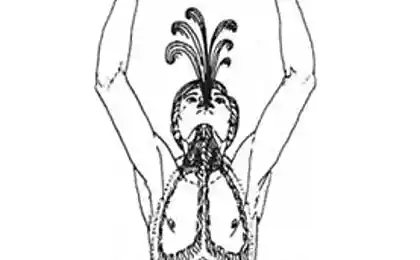1032
Interesting Facts heart disease

Heart disease - a term that covers conditions such as heart attacks, coronary artery disease, heart failure, congestive heart failure and congenital heart disease.
The most common disease of the coronary arteries, in which the blocked or narrowed arteries that supply the heart with blood.
Computed tomography of the mummies has shown that heart disease were surprisingly common in Egypt. Perhaps, in those days, there were other factors that lead to heart disease, do not include smoking, fast food and overreliance on TV.
Research Danish scientists have shown that women and men with thighs the size of less than 60cm in circumference, are at greater risk of developing heart disease.
When sudden cardiac arrest in 4 - 6 minutes the brain dies and then comes complete death. No cases of survival after cardiac arrest outside the hospital environment, there are only 1-2%.
Researchers believe that those who sits up late, are more at risk of heart disease, even if they are asleep and then eight hours. Also, one study showed that women who sleep at night for five hours, risking the health of your heart more than women sleeping position eight o'clock.
Heart attacks and sudden cardiac arrest - two different events. Heart attack (myocardial infarction) occurs when blood flow stops to the heart muscle, and it breaks down. Sudden cardiac arrest can happen simultaneously with myocardial infarction.
In the United States, more than 1000 people a day die from sudden cardiac arrest or heart attack.
In singles risk of death from sudden cardiac arrest and myocardial infarction is twice higher than that of those who live with relatives or even a roommate.
Negative emotions and depression are risk factors for sudden cardiac arrest or stroke. Conversely, the happier a person feels, the more his heart healthy.
The researchers found that a woman's heart rate at rest is a good indicator of its susceptibility to heart attacks. Women with a high heart rate (76 or more beats per minute), the probability of getting hit much higher than that of those whose heart beats 62 times per minute or less.
Age - is the most significant factor for heart disease. It is followed by the person's gender, genetic predisposition with an ethnic component, smoking, obesity, lack of physical activity, high blood pressure, all kinds of diabetes and high blood cholesterol.
Approximately 40% of people who received a myocardial infarction die before their taken to hospital.
Heart drugs interact well with additives such as gingko biloba, St. John's wort and garlic.
Menopausal women are at greater risk of developing heart disease because of the reduced level of estrogen produced by the body.
Two-thirds of deaths from myocardial infarction in women occurs in those who have never had complaints of pain in the chest.
Hypertension, when the pressure in the arteries above the norm leads to the development of diseases of the coronary arteries (atherosclerosis). This disease affects not only the heart, but the kidneys, and brain.
Laughter relaxes and widens blood vessels, which helps to protect the heart.
Compared to other days of the week, most heart attacks occur in the morning on Monday.
Doctors call the morning, "the bad time" because of the increased level of heart attacks at this time of the day. The level of stress hormones such as cortisol in the morning is always higher than that in the blood beginning of the day is thicker and more difficult to pump it as occurs dehydration.
People with diabetes, older people and women can not feel the classic pain during a heart attack. Instead, they begin to choke, they begin nausea and back pain or pain in the lower jaw.
Heart transplantation surgery can last from four to ten hours, and patients can be discharged from the hospital after 7-16 days. To prevent rejection of the implant, patients are required to take immunosuppressive agents until the end of life.
The transplanted heart beats faster than when a patient's heart was beating its own. Also, it does not respond to exercise increasing rate as fast as a normal heart.
Atherosclerosis develops after about half of the transplants of the heart. Many patients do not even know about his illness, since during transplantation the nerves leading to the heart, cut, therefore, patients with transplanted heart can not feel it.
Twenty-five percent of patients awaiting a heart transplant, dies, and not waiting for a donor organ. In the United States about 2300 transplanted donor hearts
Approximately 30% of people who die from heart disease were smokers.
Researchers believe that 25% of heart attacks go unnoticed for patients and detected only after removal of the ECG.






















